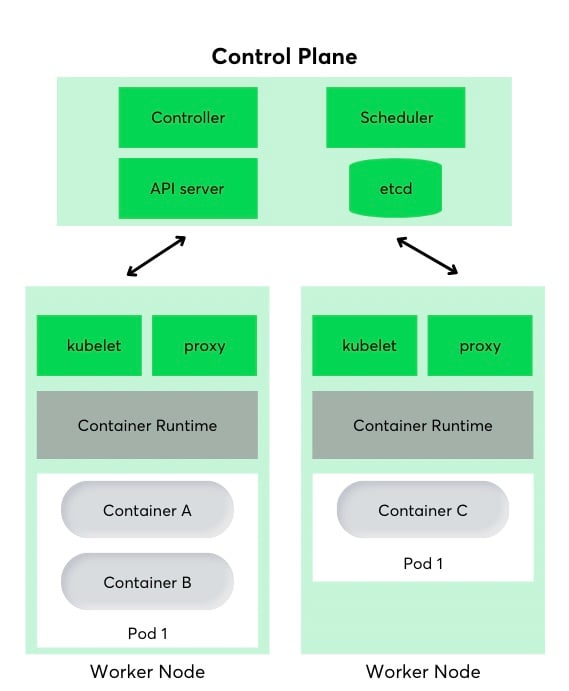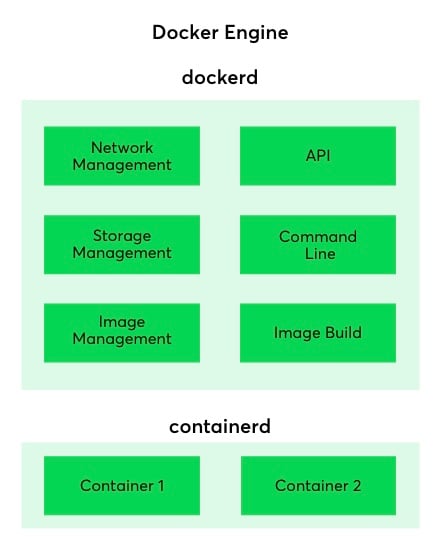Kubernetes vs Docker: Understanding Containers

The two are fundamentally different technologies that are often pitted against each other in conversations concerning containers.
So, which tool should you choose for your next project? The choice will not be easy, and to make the final decision you should be aware of the advantages and limitations of both Kubernetes and Docker.
Below we’ve highlighted the fundamental elements of both Kubernetes and Docker, explored how each technology can serve your business, discussed the pros and cons of both, and selected a few key takeaways which you can use to make an informed decision.
What is Kubernetes?
Kubernetes is a portable, extensible, open-source platform for managing containerized workloads and services. It is an open-source platform that enables companies to scale-up and meet the demands of expanding product catalogs.
Kubernetes is designed for a combination of pods, services and deployments. It is a platform that helps to manage infrastructure and, after Linux, it is the fastest growing project in the history of open Source software. Kubernetes usage continues to expand and according to recent studies it is used by over 24,400 companies around the world.

Pros of Kubernetes
The multi-cloud capability of Kubernetes is what makes the platform to stand out as well as its portability and adaptability.
Multi-cloud capability
Kubernetes is a highly capable and flexible platform that can host workloads on a single cloud as well as workflows across multiple clouds.
The multi-cloud capability of Kubernetes is one of the standout features of the platform and is part of the reason it has been so successful in recent years. Kubernetes can simply scale its whole environment from one cloud to another which grants you extensive capabilities.
In today’s market, many businesses are pursuing multi-cloud strategies with a variety of cloud applications which makes Kubernetes the ideal tool to help with extensive strategies.
An established platform
Five years ago not many would have been familiar with Kuberenetes and therefore it may have been risky to adopt. However, today thousands of IT teams use Kubernetes on a regular basis and it has been a market leader within the industry.
It is a proven and reliable solution that ensures you don’t have to undertake unnecessary risks when using it for production deployments.
When it comes to container orchestrators Kubernetes is a popular solution which also means that there is a greater pool of developers and engineers familiar with the platform.
You won’t have to spend a lot of money to find a qualified developer conversant in Kubernetes and you will also be able to benefit from a large ecosystem of complementary software projects. As a result Kubernetes is one of the most convenient and cost-effective platforms to adopt.
Portability
Kubernetes is capable of working with any type of container runtime. Moreover, Kuberenetes is also compatible with almost any type of underlying infrastructure - whether it is a public cloud, a private cloud, or an on-premises server.
Overall, this means that you are not limited in your choice of infrastructure or environment configurations. Kubernetes containers are highly portable in a way that many other container orchestrators aren’t.
Many containers are tied to particular infrastructures whereas with Kubernetes you have the freedom to experiment and make choices that suit your business.

Cons of Kubernetes
Nevertheless, Kubernetes has some disadvantages, including complex set-up and configuration process, and high cost.
Difficult to set up and configure
Kubernetes is notoriously complex and this can lead to a difficult set-up and a tricky configuration process. For developers unfamiliar with infrastructure technologies, Kubernetes can be a steep learning curve.
The Kubernetes development workflow can take some time to get used to and you will want to have at least one Kubernetes expert on your engineering team.
The one saving grace when it comes to Kubernetes complexity is that you can take advantage of services inside Azure and other cloud environments to conduct the setup and configuration.
The transition to Kubernetes can be a struggle
Your existing software needs to be adapted to run easily with Kubernetes. The time this adaptation and transition will take can be difficult to estimate and will be heavily dependent on the type of software you already run.
Kubernetes can be expensive
The expertise and personnel required to set up and run Kubernetes can sometimes lead to some heavy overheads. Not all organizations can train in-house Kubernetes experts and hiring outside talent can be expensive.
For example, the PayScale average salary for Kubernetes skilled software developers is around $115k in the US. As a result, Kubernetes may not be a viable option for small or medium-sized businesses.
What is Docker?
Docker is an open-source platform designed to assist in the development, shipping and running of applications. Docker aims to take away repetitive configuration tasks and can be used throughout the development lifecycle for easy and portable application development for desktop or cloud.
With Docker containers businesses can build, share and run applications with flexibility and security.
Pros of Docker
The main advantages of Docker are portability, great, performance, reduced deployment time down, and isolated recourses.
Portability
One of the key advantages of using Docker containers is the portability. The ability for Docker containers to run on multi-cloud platforms is incredibly useful and is ideal for businesses that work with a number of cloud solutions.
In recent years, all major cloud computing providers, including Amazon Web Services (AWS) and Google Compute Platform (GCP), have adopted Docker’s availability and added individual support.
Once you have completely tested your containerized application it can be deployed to any other system where Docker is running and it will continue to function effectively. Docker works also with other providers like Microsoft Azure, and OpenStack, and can be used with various configuration managers like Chef, Puppet, and Ansible.
Performance
Containers, unlike virtual machines, do not contain an operating system which means that they are capable of creating quickly and they are much quicker to start.
If you are looking for container technologies with great performance then a Docker container is one of the best solutions on the markets. A Docker engine is fast and powerful and will help you accomplish tasks efficiently.
Rapid and continuous deployment
Docker can reduce deployment time down to seconds and ensures that you never have to waste time. With Docker Swarm you get consistent environments from development to production.
Maintaining continuous deployment during a container lifecycle can be ensured by using the same container from development to production making sure there are no discrepancies or manual intervention.
Isolation
Each Docker container has isolated resources. The functionality helps remove applications in a cleaner way, as each application runs inside its own container. If you no longer need to use an application, Docker Swarm makes it easy to delete it’s container without causing larger inconveniences.
Isolation is provided on a per-container level by the Docker engine. As a result when using Docker containers, multiple applications can be deployed without any conflict between applications. Container isolation is an important consideration for both convenience and security and Docker is able to maintain isolated applications extremely well.

Cons of Docker
The main disadvantages of Docker are high degree of complexity or inefficient storage options.
High degree of complexity
While Docker may be comparatively more simple than Kubernetes, the complexity involved in switching to Docker containers is quite high. For some developers using Docker containers can be a steep learning curve and, as they attempt to deal with the complexities of the platform, this can lead to inefficiencies.
Monitoring
Docker offers limited monitoring solutions. For many businesses and developers this won’t be a major problem especially if you only need basic information about your containers. However, if you want more advanced monitoring that gathers data in real-time Docker is not the most compatible platform.
Inefficient storage options
Persistent data storage with Docker is complicated and ultimately inefficient. You can use Docker Data Volumes to save data in Docker, however the process is not seamless and there are easier ways to store data.
Currently, there is no easy way to connect Docker containers in a way that is reliable and convenient. In the future we may see better and more efficient storage options for Docker containers but at the moment the data storage is difficult.
When is Kubernetes better than Docker?
Kubernetes is better than Docker when you are looking for a more extensive solution. According to Azure, Kubernetes is meant to coordinate clusters of nodes at scale in production in an efficient manner, whereas Docker runs on a single node.
Kubernetes is a complex platform that is ideal for high-demand applications with complex configurations. It is a battle-tested system that is used by the biggest players on the market such as Google.
Kubernetes is supported by every major cloud provider and it’s widespread popularity is testament to the fact that it is one of the most powerful, adaptable and customizable platforms available.
When is Docker better than Kubernetes?
Kubernetes is a complex platform that can be both time consuming and expensive to set up, configure, and maintain. Docker on the other hand is easier and is often a less expensive solution in the long run.
This can be seen in the rise in Docker adoption in recent years. In 2021, there have been 7.3 million total Docker Hub accounts, up approximately 45% year-over-year. Developers are used to the Docker ecosystem and because it is relatively simple to use it continues to grow in popularity beyond some other container platforms.
Docker Swarm is easier to start with than Kubernetes and is arguably the more appropriate platform if you know you are only going to have a small workload.
Kubernetes vs. Docker: What's the difference?
Our brief overview demonstrates that neither Kubernetes or Docker are perfect. So how do you make the right decision about which one to use? The answer is straightforward: both platforms are good for specific tasks and will be suited to particular businesses.
While Kubernetes and Docker are often pitted against each other, the two platforms can be used alongside each other for better control and implementation of containerized applications.
In some ways comparing the two platforms is like comparing apples to oranges. The Kubernetes vs Docker debate will rage on but really both of them excel in different ways and your choice will often depend on which platform is more suited to your business.
One of the key takeaways when examining both container technologies is that Kubernetes is a more broad and flexible solution. Kubernetes and Docker are both capable of a wide degree of portability; however Kubernetes just slightly edges Docker if you are looking for an extensive, multi-faceted solution.
Similarly, a key takeaway from studying the utility of Docker for modern businesses is that it is incredibly useful if you need to automate the deployment of applications in containers. The Docker engine is powerful, capable of great performance and allows applications to work efficiently in different environments.
Ultimately both platforms have the potential to extend and enhance the capabilities of your business. Whether you choose to go with Docker Swarm or Kubernetes, they will be two of the leading container platforms in 2022 and for many years to come.








